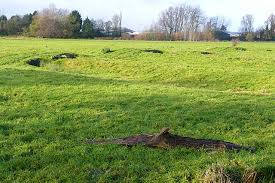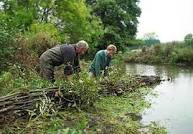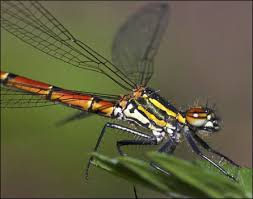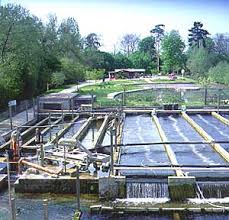

In the early
1970’s the rivers around Salisbury like the Nadder, Avon and Wylye had twice
the depth that they are now some 40 years later. We had water meadows which were flooded at
times of high water and the flow was held up to a certain extent by water
mills. The river keepers would maintain a good depth by holding or releasing
water when necessary. See pictures of the ditches below.



There were
very good reasons for this. It was all to help nature and to produce fisheries
that contained clean gravel for the fish to lay their eggs on spawn. The water
meadows became nurseries for the coarse fish until they could hold their own in
the main rivers. Flooded fields protected the spring lush grass for the new born
Lambs.
In the summer the water meadows provided good
grass for cattle that browsed them. In turn the cows dropped their cowpats onto
the meadows and kept them well fertilised. All was well with the system. There
was enough depth of water to neutralise the fertilisers and chemicals that the
farmers used for their crops and what inevitably found their way into the water
course.
The trout
fisheries would release the fish manure containing ammonia into the rivers at
regular intervals. The depth and quantity of water in the rivers helped to
nullify the toxics and our rivers some of the purist quality in the country.
The rivers were absolutely full of water insects such as shrimps, freshwater
mussels, caddis and had plenty of the right types of streamer type weed to provide
a home for the insects and cover for the fish.

River
keepers would periodically cut the weed so that the anglers could trot their
baits down the river both on the far side and the near side with a bank of weed
being left down the middle to provide a haven for insects and cover for the
fish. The angling fraternity would work together to ensure the weed was allowed
to float through each stretch of water. When weed was pulled out onto the bank
it was allowed to stay there for a few days to allow the insects to get back
into the river.



It would be then pulled back further into the
fields and allowed to rot down naturally and would provide more fertiliser for
the fields. Due to the high water levels most of the weed would make its way
down to the sea without being held up.

The river
keepers and Angling Clubs would work hard to direct water from one side of the
river to the other using shuttering. In that way the rush of water would
continually scour out the gravel bottom providing the spawning grounds for
trout and salmon to return to year after year and continue that fish life
cycle. Sounds a bit like a natural fishing heaven for us anglers. Well that was
what it was. I feel very strongly about
how many chalk stream fed rivers were systematically destroyed due to the
actions of greedy profiteers and local councils with no backbones or love for
the natural environment. Picture the situation some 40 years later.
Our water meadows have virtually disappeared
except for very few trout and Estate waters. I think this has happened all over
the country. The drive by the government to provide more and more housing drove
unscrupulous housing builders to continually lobby councils to give them
permission to build on water meadows even though the properties would almost
certainly be flooded at times of prolonged rainy periods.

Farmers were
struggling to survive and jumped at the chance to sell what they considered to
be fields that had a very low cereal yield.
Many farmers got rich on the sale
of these bank side fields and they then had no responsibility to clear the
river of trees that periodically died or blew down into the rivers. The angling
clubs and their members had to take charge of clearing them. Where some clubs
took their responsibilities seriously, others who were not so well supported
allowed nature to take over and encroach on the widths of their rivers, to the
detriment of angling in those stretches.
The water
meadows gradually disappeared with housing estates being built on them. After a
while the owners of these types of properties lobbied local councils and
subsequently the government of the day decreed that where housing was alongside
the river the water mills had to fully open their sluices at times of high
water to stop any flooding on the properties built on water meadows.
There were
many knock on effects due to this continual opening fully the sluice gates to get
rid of the excess water. Some rivers lost a lot of their depth.
The new housing bought with it a massive explosion in the human population, this new volume of people needed a drinking and waste water supply. The huge escalation in water abstraction has led to a massive reduction in the natural water supply. Ultimately rivers have lost their depth and flow as many streams have become trickles or drying up altogether. Ed
The wildlife
and fish nurseries of the water meadows started to disappear as more and more
building on them took place.


With the much lower water depths and the trout
farms regular clearing out of their trout stews, it had quite a toxic effect
for many hundred yards.
You could not catch fish in lots of these areas as the
ammonia was not being diluted to the same degree as it used to be. Coupled with
this was the fact that farmer’s fertilisers and chemicals to help their cereal
yields were still finding their way into the rivers. With less dilution, due to
lower water levels the fish and insect populations were slowly being
devastated. The lower oxygen levels and lack of water flow to scour the beds of
the rivers was destroying spawning beds, while silting up made the depths even
shallower.
To top it
all the new houses and bigger population had led to large scale abstraction of
the water, further lowering the water levels.
Slowly but
surely some stretches of the rivers were dying. Shallow water and lack of
oxygen in the summer months started to change the types of weed growing in the
rivers. The build up of silt on the bends of the rivers allowed reeds to really
get a hold on each side of the river making the widths a lot narrower.
The fish
would continually head downriver in search of deeper water and the spawning
areas they needed but could not find. Only the River Avon in and below
Salisbury held its own on the fish population. The fish had no nurseries and
most of the eggs and small fry would be flushed downstream in periods of high
rainfall.
The Avon just
above Salisbury became a dead stretch except for the deeper water in the actual
town area.
Because
there is little depth above the Fire Station the fish had no cover and as a
result of this Cormorants moved in and cleaned out a lot of the fish. In my
opinion, these days, it is not worth fishing there at any other time than in
the winter when there might be a little more depth and colour. It will never be
the same again. Double figure bags were commonplace in the 70’s, but you could
count on the fingers of one hand, swims that would give you a reasonable catch
these days.
Many Angling
Associations fought against the building on water meadows, but to no avail. The
government of the day just ignored the complaints even though much evidence was
produced to back the Association’s claims. The people who brought about the
destruction of our river system have a lot to answer for and I for one despise
them for their actions.
The
situation can never be put right, but the message for all anglers must be to
never take your fishing for granted and to defend what you have to your utmost.
We must never allow what happened around Salisbury and probably many other
tributary rivers to happen again. You never know what lengths unscrupulous
builders and supermarket stores will go to in order to make a quid or a million
at the angler’s expense. They make my blood boil at times.
No comments:
Post a Comment